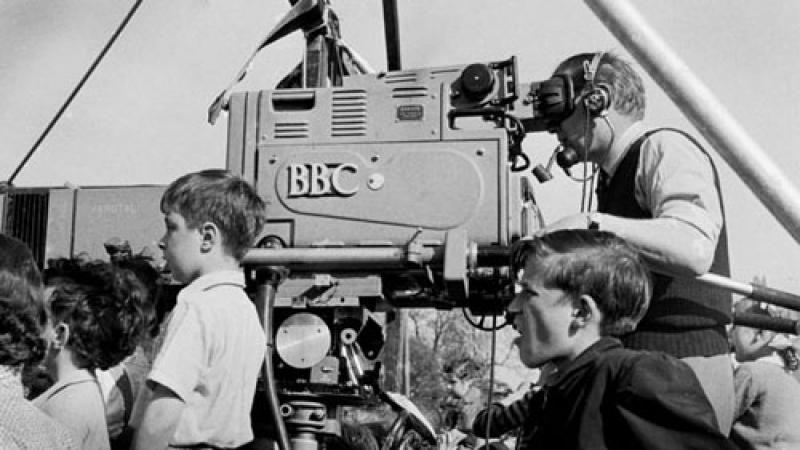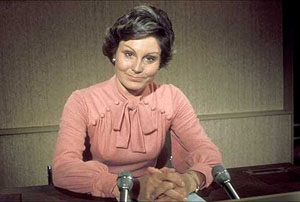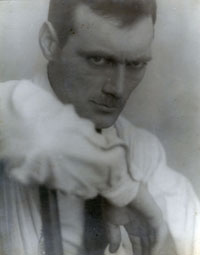Regional TV: Life Through a Local Lens/ Britain Through a Lens - The Documentary Film Mob, BBC Four | reviews, news & interviews
Regional TV: Life Through a Local Lens/ Britain Through a Lens - The Documentary Film Mob, BBC Four
Regional TV: Life Through a Local Lens/ Britain Through a Lens - The Documentary Film Mob, BBC Four
Regional telly and John Grierson's squad of documentarists revisited

I was once shown around Anglia TV’s studios by the bloke who used to say, "And now, from Norwich - the quiz of the week!” by way of introduction to the immortal Sale of the Century. A tremendous thrill, as you can imagine.
We were reminded, for instance, that the very first presenter of Top Gear was Angela Rippon, when it used to be a regional monthly programme aimed at the Midlands heartlands of the motor industry. The original telly superchef Keith Floyd was discovered at his restaurant in Bristol by BBC bon viveur David Pritchard, who stuck him on his local TV show RPM and watched his career soar vertically upwards. As for Michael Parkinson, never knowingly overshadowed, he claimed to have done the first TV interview with The Rolling Stones for Granada TV, and even to have launched a cultural revolution. “We created, without knowing it, the Sixties!” he declared, of himself and his regional telly comrades. “We tilled the ground for that to happen.”
 For anybody who experiences a morbid sinking feeling on hearing the words, “And now, the news where you are,” this film was like entering a fantastic unknown dimension, where there was no death and no gravity. In this version, local TV was not, after all, a wasteland of non-news and scintillatingly feeble light entertainment. Tyne Tees, driven by the entrepreneurial Black brothers, was said to be “like Hollywood come to Tyneside”. The regional programmes nurtured such upcoming talents as David Frost, Martin Bell, David Dimbleby and Look North’s Mike Neville, who once rewrote the balcony scene from Romeo and Juliet in Geordie. Yorkshire TV’s Austin Mitchell “came on like a big daft Yorkshire lump – and he wasn’t”, according to former ITV regional producer Sid Waddell. There was an incredible clip of Fred Trueman presenting Yorkshire TV’s pub games series Indoor League, his head enveloped by a shiny swathe of jet-black pseudo-hair. (Angela Rippon, pictured above.)
For anybody who experiences a morbid sinking feeling on hearing the words, “And now, the news where you are,” this film was like entering a fantastic unknown dimension, where there was no death and no gravity. In this version, local TV was not, after all, a wasteland of non-news and scintillatingly feeble light entertainment. Tyne Tees, driven by the entrepreneurial Black brothers, was said to be “like Hollywood come to Tyneside”. The regional programmes nurtured such upcoming talents as David Frost, Martin Bell, David Dimbleby and Look North’s Mike Neville, who once rewrote the balcony scene from Romeo and Juliet in Geordie. Yorkshire TV’s Austin Mitchell “came on like a big daft Yorkshire lump – and he wasn’t”, according to former ITV regional producer Sid Waddell. There was an incredible clip of Fred Trueman presenting Yorkshire TV’s pub games series Indoor League, his head enveloped by a shiny swathe of jet-black pseudo-hair. (Angela Rippon, pictured above.)
Regional broadcasting was eventually swallowed by rationalisation and globalisation, and economics meant that it made better business sense to commission fewer networked programmes instead of various local ones. But regional telly was like the pop charts – for every immortal classic, there were a thousand turkeys.
 Perhaps more convincingly and self-consciously mythic was the output from John Grierson’s squad of film-makers from 70 years ago, who created an authentic school of British documentary while operating as the GPO Film Unit and later the Crown Film Unit. As Britain Through a Lens made clear, Grierson had little interest in merely recording real-life events, although that was intrinsic to his method. He wanted to “change the country with films about real life”, and create a sense of social unity in Depression-hit 1930s Britain by illustrating the interdependence of all strata of society. Night Mail (1936), a carefully staged and scripted depiction of the workings of the London to Scotland mail train, stands as possibly the finest specimen of this kind of sculpted reality.
Perhaps more convincingly and self-consciously mythic was the output from John Grierson’s squad of film-makers from 70 years ago, who created an authentic school of British documentary while operating as the GPO Film Unit and later the Crown Film Unit. As Britain Through a Lens made clear, Grierson had little interest in merely recording real-life events, although that was intrinsic to his method. He wanted to “change the country with films about real life”, and create a sense of social unity in Depression-hit 1930s Britain by illustrating the interdependence of all strata of society. Night Mail (1936), a carefully staged and scripted depiction of the workings of the London to Scotland mail train, stands as possibly the finest specimen of this kind of sculpted reality.
The outbreak of World War Two gave Grierson (pictured above) and his gifted team – which included Basil Wright, Humphrey Jennings and Harry Watt – undreamed-of scope to splice propaganda with creative inspiration. London Can Take It (1940) was designed to persuade the Americans to come to the aid of Blitz-battered Britain, and worked well enough to bag an Oscar nomination. Target for Tonight was an ode to the RAF’s dogged fight-back against the Hun, while Diary for Timothy wondered what the future might hold as the war drew to a close. It all pointed to the conclusion that the most powerful documentaries are the most subjective and personal ones... in which case, maybe they shouldn’t be called documentaries at all.
Share this article
The future of Arts Journalism
You can stop theartsdesk.com closing!
We urgently need financing to survive. Our fundraising drive has thus far raised £49,000 but we need to reach £100,000 or we will be forced to close. Please contribute here: https://gofund.me/c3f6033d
And if you can forward this information to anyone who might assist, we’d be grateful.

Subscribe to theartsdesk.com
Thank you for continuing to read our work on theartsdesk.com. For unlimited access to every article in its entirety, including our archive of more than 15,000 pieces, we're asking for £5 per month or £40 per year. We feel it's a very good deal, and hope you do too.
To take a subscription now simply click here.
And if you're looking for that extra gift for a friend or family member, why not treat them to a theartsdesk.com gift subscription?
more TV
 The Hack, ITV review - plodding anatomy of twin UK scandals
Jack Thorne's skill can't disguise the bagginess of his double-headed material
The Hack, ITV review - plodding anatomy of twin UK scandals
Jack Thorne's skill can't disguise the bagginess of his double-headed material
 Slow Horses, Series 5, Apple TV+ review - terror, trauma and impeccable comic timing
Jackson Lamb's band of MI5 misfits continues to fascinate and amuse
Slow Horses, Series 5, Apple TV+ review - terror, trauma and impeccable comic timing
Jackson Lamb's band of MI5 misfits continues to fascinate and amuse
 Coldwater, ITV1 review - horror and black comedy in the Highlands
Superb cast lights up David Ireland's cunning thriller
Coldwater, ITV1 review - horror and black comedy in the Highlands
Superb cast lights up David Ireland's cunning thriller
 Blu-ray: The Sweeney - Series One
Influential and entertaining 1970s police drama, handsomely restored
Blu-ray: The Sweeney - Series One
Influential and entertaining 1970s police drama, handsomely restored
 I Fought the Law, ITVX review - how an 800-year-old law was challenged and changed
Sheridan Smith's raw performance dominates ITV's new docudrama about injustice
I Fought the Law, ITVX review - how an 800-year-old law was challenged and changed
Sheridan Smith's raw performance dominates ITV's new docudrama about injustice
 The Paper, Sky Max review - a spinoff of the US Office worth waiting 20 years for
Perfectly judged recycling of the original's key elements, with a star turn at its heart
The Paper, Sky Max review - a spinoff of the US Office worth waiting 20 years for
Perfectly judged recycling of the original's key elements, with a star turn at its heart
 The Guest, BBC One review - be careful what you wish for
A terrific Eve Myles stars in addictive Welsh mystery
The Guest, BBC One review - be careful what you wish for
A terrific Eve Myles stars in addictive Welsh mystery
 theartsdesk Q&A: Suranne Jones on 'Hostage', power pants and politics
The star and producer talks about taking on the role of Prime Minister, wearing high heels and living in the public eye
theartsdesk Q&A: Suranne Jones on 'Hostage', power pants and politics
The star and producer talks about taking on the role of Prime Minister, wearing high heels and living in the public eye
 King & Conqueror, BBC One review - not many kicks in 1066
Turgid medieval drama leaves viewers in the dark
King & Conqueror, BBC One review - not many kicks in 1066
Turgid medieval drama leaves viewers in the dark
 Hostage, Netflix review - entente not-too-cordiale
Suranne Jones and Julie Delpy cross swords in confused political drama
Hostage, Netflix review - entente not-too-cordiale
Suranne Jones and Julie Delpy cross swords in confused political drama
 In Flight, Channel 4 review - drugs, thugs and Bulgarian gangsters
Katherine Kelly's flight attendant is battling a sea of troubles
In Flight, Channel 4 review - drugs, thugs and Bulgarian gangsters
Katherine Kelly's flight attendant is battling a sea of troubles
 Alien: Earth, Disney+ review - was this interstellar journey really necessary?
Noah Hawley's lavish sci-fi series brings Ridley Scott's monster back home
Alien: Earth, Disney+ review - was this interstellar journey really necessary?
Noah Hawley's lavish sci-fi series brings Ridley Scott's monster back home

Add comment